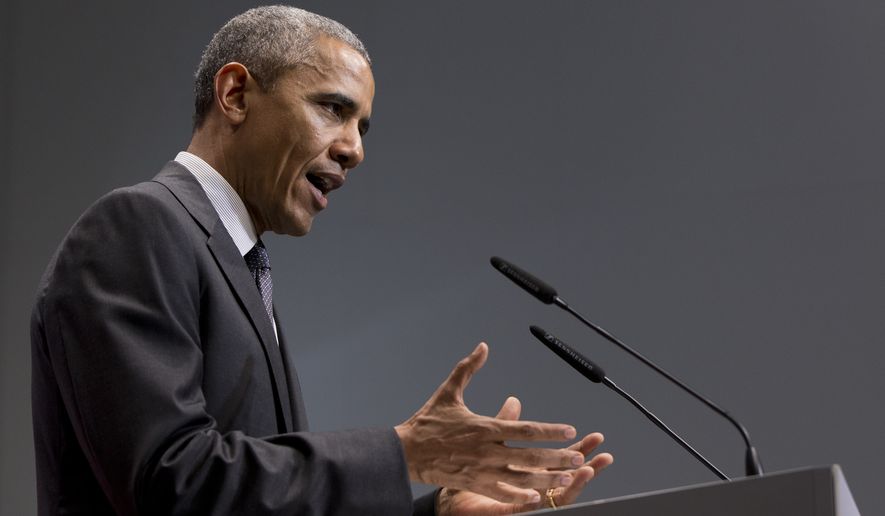President Obama assaulted the nation’s top court and seemed to criticize the U.S. legal system as a whole Monday, with the former constitutional law professor declaring that the Supreme Court was wrong to even accept a challenge to his signature health care reform law and deriding the fact that an “individual district court judge” was able to derail his deportation amnesty.
The president made the comments during a press conference in Krun, Germany, after the Group of Seven summit.
Mr. Obama’s legacy-building accomplishments are increasingly ending up in the federal court system.
The Supreme Court will decide by the end of next month whether the Affordable Care Act should be interpreted as prohibiting any tax credits for states that set up their own health care exchanges. If those credits are eliminated, many Obamacare customers will be unable to afford their coverage and the entire system could collapse.
Mr. Obama has long defended the legality of his namesake health care law, but he went further Monday by directly criticizing the Supreme Court for agreeing to hear the case.
“There is no reason why the existing exchanges should be overturned through a court case. It has been well-documented that those who passed this legislation never intended for folks who were going through the federal exchange not to have their citizens get subsidies,” he said. “This should be an easy case. Frankly, it shouldn’t have even been taken up. Since we’re going to get a ruling pretty quickly, I think it’s important for us to go ahead and assume the Supreme Court is going to do what most legal scholars who have looked at this would expect them to do.”
SEE ALSO: Obamacare subsidy court ruling shakes Pennsylvania, Delaware, not other states
Legal analysts say the president’s confidence is misplaced and that it is difficult to predict which way the court will rule.
On immigration, Mr. Obama said he would abide by Judge Andrew S. Hanen’s injunction halting his amnesty program. He also scoffed at the notion that one ruling by one judge means his executive action is dead, and he vowed to press ahead to help illegal immigrants.
“Even if it’s an individual district court judge who is making this determination, we’ve got to go through the process to challenge it. And until we get clarity there, I don’t want to bring people in, have them apply and jump through a lot of hoops only to have it deferred and delayed further,” the president said.
Judge Hanen halted Mr. Obama’s amnesty Feb. 16, ruling that the president’s policy to grant three-year work permits and legal documents to as many as 5 million illegal immigrants was big enough to have gone through public notice and comment under the terms of federal law.
The administration appealed Judge Hanen’s injunction and asked for an immediate stay, but the appeals court rejected that request.
Mr. Obama decided not to go to the Supreme Court for a stay. Immigrant rights advocates said he was not defending his policy aggressively enough.
SEE ALSO: Obama derides judge who blocked amnesty
The president’s comments Monday were some of his strongest on outstanding cases, but it was not the first time he has called out judges and courts.
In his 2010 State of the Union address, he rebuked the Supreme Court for its campaign finance decision in the Citizens United case. Justice Samuel A. Alito Jr. could be seen mouthing the words “not true” while Mr. Obama was saying the decision could allow big-money donors to control elections.
Mr. Obama suffered an embarrassing loss last year when the Supreme Court struck down his attempt to grab more power over recess appointments. In a unanimous decision, the justices ruled that the president overstepped his constitutional authority.
In the health care case this year, analysts say, Mr. Obama is taking a major political risk for the sake of defending his defining domestic achievement.
“It could backfire in the sense that if you go after the court before it hands down a decision — I don’t know how many justices will say, ’We don’t want to be bullied by the president.’ It’s a close case. I could see someone pushing back by going against the president,” said Louis Fisher, a scholar in residence at the Constitution Project who spent more than four decades as a senior specialist in the separation of powers at the Library of Congress.
“I think it’s careless to be talking before the decision comes down,” he said.
Beyond health care and immigration, other pieces of Mr. Obama’s domestic agenda are in legal trouble. The president’s plan to limit carbon emissions from power plants is winding its way through the federal court system, and many analysts say it likely will end up before the Supreme Court.
If courts kill health care reform, deportation amnesty or carbon regulations, it would represent a serious blow to the president’s legacy. Analysts say that is what is motivating Mr. Obama to speak out so strongly.
Immigration reform “goes to legacy, as does Obamacare. … I think that has something to do with it. I think he’s frustrated,” said Carl W. Tobias, a professor at the University of Richmond School of Law. “If he were to lose all of those cases, that would be important” to his legacy.
⦁ Tom Howell Jr. contributed to this report.
• Ben Wolfgang can be reached at bwolfgang@washingtontimes.com.




Please read our comment policy before commenting.